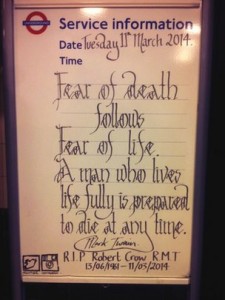There I was at the gym trying to burn some winter excess weight in time to welcome summer in good shape and spirit when I  noticed the gym TV screens were showing the face of Bob Crow, the General Secretary of Rail, Maritime and Transport union (RMT), with many known trade union leaders paying tributes. My first thought was: “oh no, don’t tell me he is retiring from Trade unionism”
noticed the gym TV screens were showing the face of Bob Crow, the General Secretary of Rail, Maritime and Transport union (RMT), with many known trade union leaders paying tributes. My first thought was: “oh no, don’t tell me he is retiring from Trade unionism”
However, when the unmistakable hair and face of the Mayor of London, Boris Johnson came on the screen, I slowed down my pace on the treadmill to read what one of Bob Crow’s arch enemies had to say about him, it was then it dawned on me that this was not a retirement tribute but a death eulogy. Apparently Bob Crow had died early in the morning (11 March 2014) of what is suspected to be a heart attack. This came as a shock because just the day before, Bob was on TV making yet another threat of a possible RMT strike that has been known to paralyze activities in London.
I am saddened by the sudden death of Bob Crow. He was one of the few outstanding Trade unionists in UK. His unwavering and unquestionable commitment to workers rights reminded me so much of the reason I became a Trade unionist. It was all about passion, commitment and a continuous fight for decent work, decent pay and a better life for all.
Trade unionism as I used to know it was not just about a career choice. It seeps into every facet of your life that eventually it becomes your life. It is a pity that many trade union leaders have lost that passion and now veered more towards satisfying the employers, government and multinationals rather than delivering to their paying members. Unfortunately many trade union leaders are no longer solely funded by membership fees but by politicians and government largesse. In fact, Nigeria which used to be a hot bed of radical trade unionism, is an unfortunate example of how low labour movements and their leaders have sunk.
Love him or hate him, Bob Crow was one unionist that could not be ignored. He commanded respect, awe and fear from friends and enemies alike. His members loved him, his adversaries hated him, and everyone recognised his doggedness. His enemies could not ignore him and those who value equality held him in high esteem.
Bob Crow is one of the last generations of left trade unionists that chose to stand firmly for the rights of workers in the face of crass capitalism that is always cloaked as progress in the workplace.
Bob Crow started working at the age of 16 on the underground and rose to become General Secretary of the National Union of Rail, Maritime and Transport Workers (RMT) from 2002 until his death. He was able to make tremendous progress in the lives of his members. Even when trade union membership was drastically declining in UK, the membership of his union kept rising. He fiercely advocated and defended the right of his members to decent wages. He was able to negotiate decent wages for his members, from the tube drivers to the underground cleaners.
Sometimes seen as divisive, he was never afraid of speaking his mind or standing up for his beliefs, principles, ideology and convictions. When he felt the Labor party was going the wrong way, he took a decisive step and led his union to support other Socialist orientated parties, which eventually led to the expulsion of RMT from the Labour party.
Often loathed by many London commuters who sometimes had their transport disrupted because of strike actions called over planned cuts and ticket office closures, still he commanded respect for standing up to the powers that be and giving the underdogs a voice in the scheme of things.
Bob Crow once said::
“You’ve got to recognise that the job you do ain’t about being nice. The job we do is about defending our members. And as far as I’m concerned, if I can get job security and decent pay for my members I couldn’t give two hoots about being unpopular.”
Conservative London mayor, Boris Johnson said of Crow:
“This was a guy who really fought for his members and who stuck up for his point of view. He was a fighter and a man of character”
TUC Secretary-General Frances O’Grady described him as:
“an outstanding trade unionist, who tirelessly fou ght for his members, his industry and the wider trade union movement”
ght for his members, his industry and the wider trade union movement”
Labor Party leader Ed Miliband said he had been a “passionate” campaigner.”
Liberal Democrat leader Nick Clegg said Mr Crow had been a “fighter and a force”.
His brother Richard crow said of him:
“People moaned that he lived in a council house, that he never drove a car – he lived a life of the average guy in the street and that’s a rare thing these days. When people have a high office in life they fall for the big trappings of the flash cars and the big hotels and big houses. But Bob wasn’t like that, he was a genuine person of the people.”
Robert Crow (13 June 1961 – 11 March 2014) was no doubt one of the last of a dying generation of trade unionists who embraced unionism as not just a career but a life. He was an unrepentant socialist and atheist. Thank you Bob Crow for your service to the labour movement and humanity, you will surely be missed.


He sounds like a hero.
RIP
I strongly disagree that Bob was the ‘last of a dying generation of trade unionists.’ That identifies the RMTs successes far too much with one person.
London Underground drivers in particular are in a strong position in relation to their employers, holding the keys to the capital’s mass transit system. A character like Bob Crow, transplanted to another industry like the NHS, may not have had such an impact as he did.
What makes a good trade union is a certain type of interplay between its members and the trade union leadership. The risk of over-personalising the RMTs small succcesses to Bob is that the employers might come back with the message ‘ah, well, now Bob Crow’s gone…’ And it would be a big bluff, but one that the trade union collective does not need to be primed to fall for. The RMT is a formidable union because of RMT members, who allowed a strong character like Bob to rise to represent them. But those members are still there, and they’re not going to go away. There are plenty of other strong characters to take Bob Crow’s place.
Notwithstanding that, death makes heros of most of us. Bob’s memory is best served by honoring his dispensibility.
@chigau (違う)- Yeah, he is definitely a hero to his many members who benefited from his type of leadership and have decent wage to show for it. He is also a hero to those pf us who appreciate sincere, passionate, committed and down to earth leaders.
exi5tentialist- You wrote
When I said “last dying generation of trade unionists”, I wasn’t referring to just the RMT union, I mean the whole labour movement, national and international. As a trade unionist who was also a Vice president of the International Trade Union Congress, I have seen trade union leaders in all their shades, colours and sizes. Therefore, I understand that the likes of Bob Crow, who strongly identify with his members not just in words but in actions and deeds are indeed a dying generation amongst trade union leaders. Trade unionism is now more of a career than an expression of ideology and a lifetime commitment to workers rights. And more and more trade union leaders are coming across as business corporates rather than comrades.
The NHS , Teachers and health workers, are all in a strong position to ground the whole of UK as a union if they so wish, London Underground drivers are not particularly stronger in terms of negotiating power than say NHS workers. This is not to say members do not contribute to the success of their own unions; however the impact of good leadership cannot be overemphasized. Voluntary union membership does not just grow by itself; it takes good leadership and delivery of promises to see a great increase in union membership when the trend was declining union membership. Bob Crow delivered and union membership under his leadership hugely increased.
Bob Crow would still have made good impact in whatever union he led because of his character, ideology, passion and the fact that he does not easily bow to system pressure.
I do not think the tube driver who is paid an annual salary of about 42,000GBP or the underground cleaner who gets a very good monthly pay would agree with you that these are small successes. And as to the employers thinking “aah, well, now Bob Crow’s gone”, good leaders do not build themselves they build their membership. RMT as a union must have learned a lot under the leadership of Bob Crow and that legacy include perseverance, strength, and good negotiating skills. Those are values a good leader like Bob Crow would have built and encouraged in many of his members. So no, the union is not going to fall apart because it lost a great leader, it is going to move forward stronger because of the legacy left behind by a great leader.
With respect I am almost exactly the same age as Bob Crow and I really do take issue with this notion of a ‘dying generation of trade unionists’. However the sentence is constructed, the choice of words reeks of a defeatism that is really badly misplaced.
In many ways the rise of Bob Crow was unexpected and something of a surprise after decades of depression in the trade union movement; it was very much the generation before him who succumbed to the Tory onslaught, it would be more reasonable to see Bob Crow as the start of a new generation of trade unionists who are proudly independent, especially of the Labour Party; the question is now how to build on the RMT’s successes (not small to them -- no, of course not) and replicate them across other parts of the trade union movement. However, if we give undue emphasis to clever and strong leaders, we will get nowhere. Different parts of the economy have different status in meeting the immediate needs of capitalism. It would be wrong to overlook that in analysing why some industrial action has been successful, and some has not.
My apologies I missed a “/blockquote” tag after ‘NHS workers’
I just heard that Tony Benn has also passed at age 88.
Yes -- today’s cartoon in The Guardian is just priceless: http://www.theguardian.com/commentisfree/cartoon/2014/mar/14/tony-benn-bob-crow